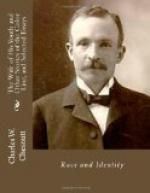Dick retraced his footsteps towards the inn. The young woman chanced to look out of the window and saw the handsome young gentleman she had waited on a few minutes before, standing in the road a short distance away, apparently engaged in earnest conversation with a colored man employed as hostler for the inn. She thought she saw something pass from the white man to the other, but at that moment her duties called her away from the window, and when she looked out again the young gentleman had disappeared, and the hostler, with two other young men of the neighborhood, one white and one colored, were walking rapidly towards the Falls.
IV
Dick made the journey homeward alone, and as rapidly as the conveyances of the day would permit. As he drew near home his conduct in going back without Grandison took on a more serious aspect than it had borne at any previous time, and although he had prepared the colonel by a letter sent several days ahead, there was still the prospect of a bad quarter of an hour with him; not, indeed, that his father would upbraid him, but he was likely to make searching inquiries. And notwithstanding the vein of quiet recklessness that had carried Dick through his preposterous scheme, he was a very poor liar, having rarely had occasion or inclination to tell anything but the truth. Any reluctance to meet his father was more than offset, however, by a stronger force drawing him homeward, for Charity Lomax must long since have returned from her visit to her aunt in Tennessee.
Dick got off easier than he had expected. He told a straight story, and a truthful one, so far as it went.
The colonel raged at first, but rage soon subsided into anger, and anger moderated into annoyance, and annoyance into a sort of garrulous sense of injury. The colonel thought he had been hardly used; he had trusted this negro, and he had broken faith. Yet, after all, he did not blame Grandison so much as he did the abolitionists, who were undoubtedly at the bottom of it.
As for Charity Lomax, Dick told her, privately of course, that he had run his father’s man, Grandison, off to Canada, and left him there.
“Oh, Dick,” she had said with shuddering alarm, “what have you done? If they knew it they ’d send you to the penitentiary, like they did that Yankee.”
“But they don’t know it,” he had replied seriously; adding, with an injured tone, “you don’t seem to appreciate my heroism like you did that of the Yankee; perhaps it ’s because I was n’t caught and sent to the penitentiary. I thought you wanted me to do it.”
“Why, Dick Owens!” she exclaimed. “You know I never dreamed of any such outrageous proceeding.
“But I presume I ’ll have to marry you,” she concluded, after some insistence on Dick’s part, “if only to take care of you. You are too reckless for anything; and a man who goes chasing all over the North, being entertained by New York and Boston society and having negroes to throw away, needs some one to look after him.”




